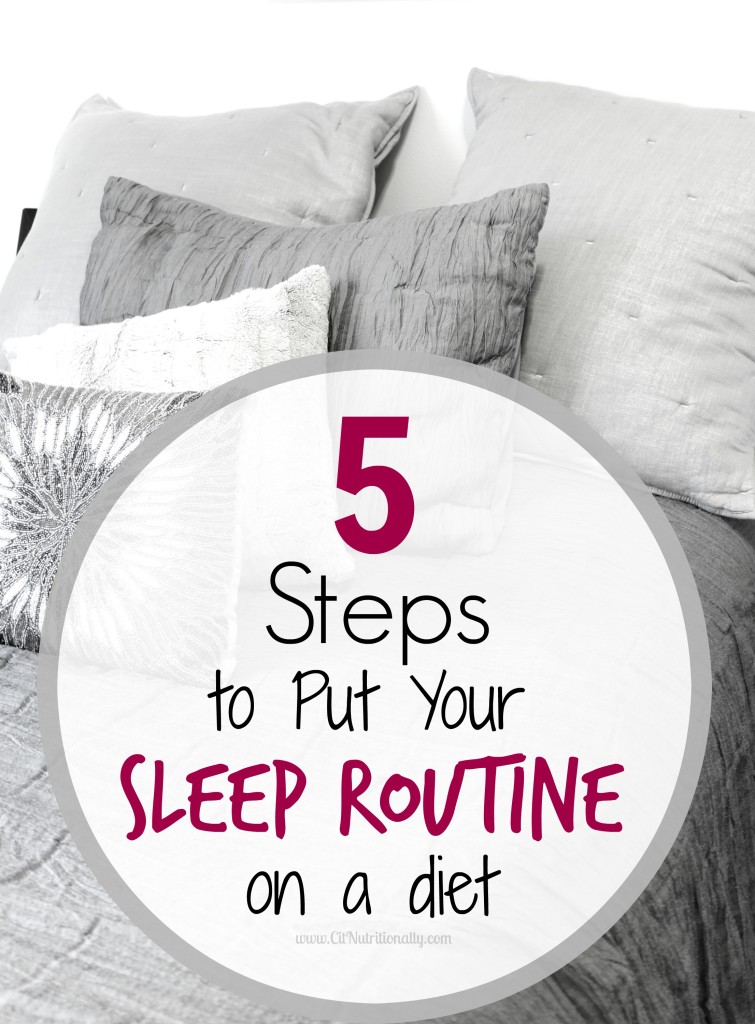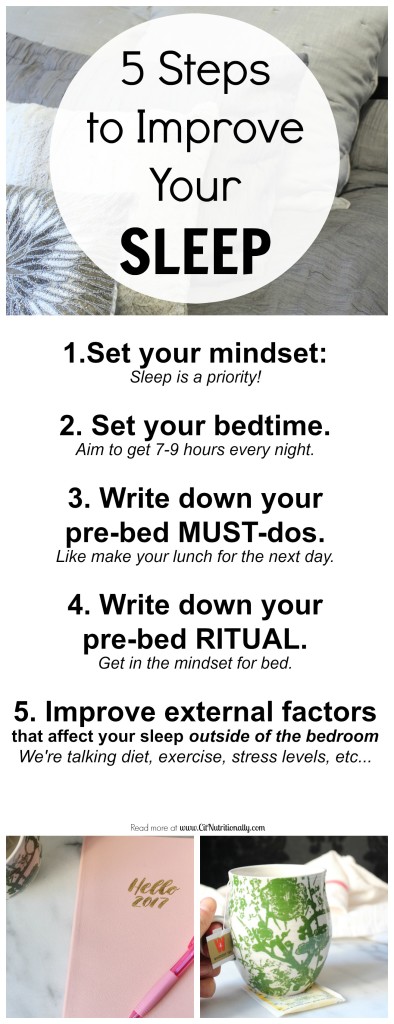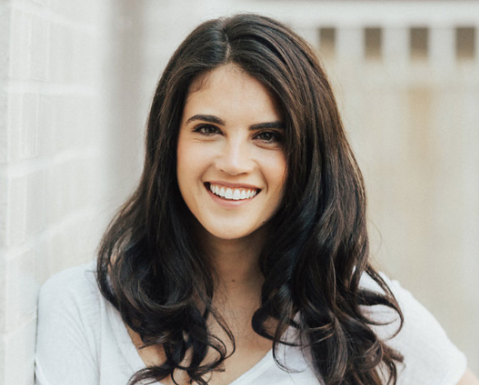5 Steps to Improve Your Sleep
Restless nights? Running on no sleep? Tons of food cravings? Then you may need to put your sleep routine on a diet! For this week’s 52 Weeks to See Your Life Nutritionally I’m sharing 5 steps to improve your sleep you can implement tonight!
When I first set my intentions for 2017 SLEEP was at the top of my list. 2016 was full of sleepless nights thanks to my dietetic internship and keeping this baby going, stress that kept me tossing and turning (or not falling asleep in the first place), and trying to squeeze in some resemblance of a social life (HA, yeah right!).
So now that I’ve graduated, I’m working on mah own, setting my own schedule and hopefully living a more balanced life than werk werk werk werk werk ((although S may tell you differently!)), I decided to put my sleep routine on a diet…
And now I want to help you do the same so I’m sharing the 5 steps to improve your sleep you need to start implementing ASAP!
You can scroll to the bottom of this post to see the 5 steps to improve your sleep, but first, I want to explain why sleep is SO important and how sleep is related to your diet… We’re talking basics babes…
I find there are two main groups of people when it comes to sleep… the first who live by the “I’ll sleep when I’m dead” mantra, and the second who live for naps and sleeping in on the weekend. Sure, there’s a third and they’re the perfect 8 hours a night group. We get it, you’re doin’ it right! But as for the other two groups, neither is desired.
In case you didn’t already know, sleep is a necessity… even if scientists don’t reallyyyy know why. We think better, move better, eat better, and overall just FEEL better when we’re well rested.
Although defining “well rested” is very different for each of us. I know I do my best on 8 to 9 hours of sleep. ((I usually average 6-7, which is why my sleep regimen is going on a diet this year!)) But why 8 hours? Where did this number come from?
According to the National Sleep Foundation, the 7 to 9 hours that are recommended for healthy adults comes from an extensive literature review of over 300 studies that examined sleep patterns and outcomes across various age ranges. Outcomes included measures of performance, cognition, mood, attention deficit, various medical conditions and so on. These recommendations, of course, are for healthy adults. You can see the rest of the study here to see recommendations for various age ranges.
So we know we need sleep to think sharper and to perform better at work and school… but to eat healthier and exercise more as well? YES! Sleep is now being thought of as another piece in the let’s solve the obesity epidemic in America puzzle. And for good reason…
Not to get all #nutritionnerd on ya, but studies consistently show that individuals who receive an adequate amount of sleep are healthier. Sleep-deprived individuals had lower glucose tolerance (which could resemble the beginning stages of diabetes and impaired carbohydrate metabolism!) and disturbances in their hormone levels (including thyroid hormone and cortisol levels). Moreover, individuals who are stressed and in a sleep debt may have an increased appetite due to hormonal changes in your hunger and satiety hormones. Since I have yet to meet an adult who isn’t stressed about something ((so sad, I know!)), I think it’s safe to say that even short-term sleep deprivation can increase our propensity towards weight gain and obesity.
[Tweet “The MUST-READ 5 Steps to Improve Your Sleep you can start implementing NOW! #sleep #insomnia #healthylifestyle”]
But what came first, the chicken or the egg? Does what we eat influence our sleep or does how we sleep influence what we eat?
Right now, the answer is BOTH. Like I just alluded to, not sleeping can increase carbohydrate cravings, the desire for comfort foods and makes it realllllllly hard for you to choose the kale salad over the burrito at lunch. At the same time, not eating well can impede your sleep. And such, a vicious cycle forms.
Here are the top 3 diet-related sleep offenders and promoters and why…
3 diet-related sleep offenders:
- Alcohol may make you fall right asleep, but you’re not getting the same quality sleep you would have without the nightcap. So proceed with caution!
- Caffeine may help you get out of bed in the morning, but if you’re consuming too much or too late in the day, it can interfere with a quality nights sleep, continuing the cycle of over-caffeination ((is that a word??)).
- A heavy meal before bed can weigh you down and cause digestive discomfort, which can impede quality sleep, but also leave you full in the morning, preventing you from kick-starting your metabolism with a healthy breakfast. So avoid eating about 2-3 hours before bed…especially if you have a history of reflux.
OK and one more ((because I know this affects my sleep))… being TOO hydrated too close to bedtime, which leads to waking up ((sometimes more than once!)) in the middle of the night.
3 diet-related sleep promoters:
- A light, dairy-rich protein snack an hour before bed. I know I said to avoid eating 2-3 hours before bed, but if you’re actually hungry and trying to fall asleep, well, you probably know how tough it can be to hit the hay! Dairy contains tryptophan, an amino acid (read: building block of protein) that can help you fall asleep. Another option… a few slices of turkey with whole grain crackers. The combination of protein and complex carbohydrates (dairy contains both!) seems to be key here.
- Chamomile tea can be a great start to your bedtime routine (see below) because slowly sipping a hot beverage is calming to most. There’s no true science behind this one, but, hey, give it a try and see if it works for you!
- Magnesium-rich foods, like whole grains, may benefit your sleep hygiene by helping you stay asleep, according to some research.
So you want to put your sleep routine on a diet?!
GREAT IDEA! I may not believe in food “diets” ((in the way most of us think about dieting)), but I DO think your sleep could use a diet. It may take some restriction ((like putting down your smartphone!!)), some willpower ((saying no to another glass of wine at happy hour)), and practice ((because it takes at least 21 days to make a habit)), but I PROMISE it WILL be worth it…and I’m doing it right along side with you!
So here are 5 steps to improve your sleep…
1.Set your mindset: Sleep is a priority! We can’t be successful at something without making it a priority (in my humble opinion). So commit to yourself — for at least this week — that sleep is your number one priority. “Just do it” ~Nike
2. Set your bedtime. This is the time you need to be SLEEPING, not getting into bed, in order to sleep at least 8 hours a night. I’m assuming you need 8 hours because that’s the average amount of sleep most adults need, but you can experiment for yourself.
To start, take your wake-up time and count back 8 hours. This is the time you must be sleeping. For example, if you need to wake up at 6:30am, then 10:30pm is your bedtime to get 8 hours of sleep.
3. Write down your pre-bed to-dos. What do you NEED to get done before bed? Check your emails one last time, pack your breakfast and lunch for tomorrow, lay out your gym clothes and your outfit for work, wash and do your hair (I feel ya!)… This should all be done an hour before your bedtime (so before 9:30pm in the example I’ve been using).
This is also where you shut off electronic devices!! I know it’s hard…but you can do it! Say g’bye to Instagram ((wahhhh)) and maybe even remove your phone/ipad/laptop from your bedroom!
4. Write down your pre-bed ritual. I think this is a fun part! Let’s make a ritual for the hour before your bedtime. A few things that relax you, get you in the mood for bed. So at 9:30pm, sip a small cup of chamomile tea to unwind and relax, write down what you must get done the next day so it’s not a worry on your mind before bed, and maybe take a few deep breaths or listen to some calming music.
5. Improve external factors that impact your sleep. This is a loaded step. And likely not going to happen in one week. #truth BUT, baby steps can be taken to influence a healthy sleep routine. I’m talking about…
- Your diet — we’re working on this one each week. Have you added more veggies into your diet? Perhaps swapped in whole grains instead of refined white carbohydrates?? Here are 50 small things you can do to improve your diet to get a jump start!
- Also, aim to eat your last meal 2-3 hours before bed. If you need a light snack, as mentioned above, OK, but your last meal should be at least 3 hours before bedtime.
- Your exercise routine. Have you found an activity you love to move more in 2017? It WILL help your sleep too!
- Your caffeine intake — This is where we cut back on that afternoon cup of java. It may be difficult on day 1 (OK, and days 2, 3 and 4 too!), but no caffeine after 2pm. And then let’s move it up to 12pm!
- Your alcohol intake — Let’s quit the daily nightcap to see if it’s impacting your sleep.
- Your use of bluelight devices close to bedtime. Shut. Them. Off!
- Your stress levels — Have you started some deep breathing exercises? Stretching to relieve stress? Taken up yoga? Writing down to-do lists to get them out of your head?
Sure, it’s easy to write a 5-step plan (that actually involves your entire lifestyle), but truly focusing on and implementing these 5 steps to improve your sleep take some work. However, just being more conscious of your sleep routine may help you fall and stay fast asleep.
AND don’t forget…you don’t have to implement everything at once…it’s A LOT! So baby steps, guys! I just wanted you to have a bunch of information you can call on at anytime…hopefully day, not night! 😉
How are you going to put your sleep routine on a diet?
XO
Let’s get social!
Facebook: C it Nutritionally
Twitter: @ChelseyAmerRD
Instagram: @CitNutritionally
Pinterest: ChelseyAmer







 Hi there!
Thanks for stopping by! I'm Chelsey, an online Registered Dietitian, recipe developer, budding photographer, and coffee addict! My mission is to help you feel good through food by answering the question "What should I eat?" Let's make nutrition approachable!
I hope you enjoy my personal collection of simple, healthy, food allergy friendly and nutritiously delicious recipes, plus tips and tons of tricks that will help YOU live a nutritionally-balanced life! I look forward to getting to know you better...
Hi there!
Thanks for stopping by! I'm Chelsey, an online Registered Dietitian, recipe developer, budding photographer, and coffee addict! My mission is to help you feel good through food by answering the question "What should I eat?" Let's make nutrition approachable!
I hope you enjoy my personal collection of simple, healthy, food allergy friendly and nutritiously delicious recipes, plus tips and tons of tricks that will help YOU live a nutritionally-balanced life! I look forward to getting to know you better...








Awesome post! I agree that sleep is such a huge factor in our health. Having your bedroom as a sanctuary is a great step towards getting a good night’s sleep.
Thank you!!! Sleep us HUUUUUGEEE!!! 🙂
Love this post – sleep is SO important and an integral piece of our health! Now I just need my two month old to read this post and get with the program. 😉